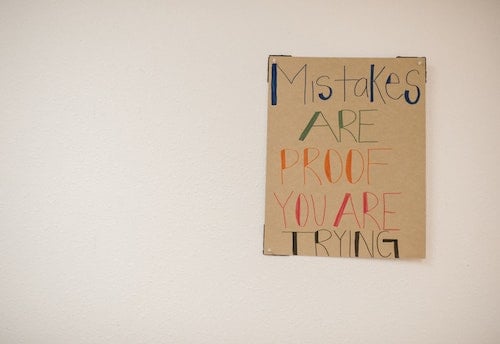Why Confident Learners Are Better at Second Language Acquisition
When it comes to language learning, there seems to be a close relationship between confidence and performance. And, while it’s difficult to say whether confident learners learn faster because of their confidence or if it is a natural ability that leads to confidence, one thing is for sure –confident learners, those who are not afraid of making mistakes and seem to enjoy the learning process, have a great advantage over insecure students who stay quiet and barely participate in class.
→Sign Up Now: Free Trial Language Lessons With Native Teachers!←
So, how does confidence help you learn better?
According to a recent survey conducted among our native language teachers, there are three main considerations to take into account.
Confident Learners Are Not Afraid of Making Mistakes
Did you know that the most confident learners are the ones who make the most mistakes in a language lesson?

This may seem counterintuitive at first, but think about it for a moment. One of the main characteristics of students with low self-esteem is that they tend to get a bit obsessive about errors. They are so worried that they are going to say the wrong thing that they say nothing at all.
Confident learners, on the other hand, tend to do a lot of speaking, and they focus on what they want to say as opposed to how they say it. And of course, the more someone speaks in a new language, the more they will learn.
Making mistakes is not just proof that you are using the language, playing with its countless possibilities; it is also an excellent way of helping your teacher know what your strengths and weaknesses are. By speaking in class, you help your tutor know what skills you should focus on or what kind of activities you could profit from.
Ricardo, a Spanish teacher from Valencia who agreed to take part in this article, says “Nothing in this life is perfect, and that certainly applies to language skills. Even the best learners have a slight accent or make grammar errors sometimes, and that is completely fine. The secret is to see mistakes not as problems but as learning opportunities”.
Confident Learners Seek More Opportunities for Practice
Your typical confident language student is an enthusiastic person who just loves speaking games and raises their hand more often than everyone else during group discussions. And, while some people may find them annoying and call them Mr. or Miss Granger (you know, after Harry Potter’s Hermione), the truth is that confident learners learn faster because they’re always seeking opportunities for practice.
Let’s suppose we are talking about guitar lessons instead of language courses. At the front of the class we have Nico, who practices on his instrument every day, even outside the music school! And then (there, at the back) there’s Sue. Sue is a gifted student, but because she’s afraid of playing unless she’s totally alone, she only practices twice or three times a week.
Who do you think will be able to play “Hallelujah” sooner?

With language lessons, it’s pretty much the same. When asked “how does lack of confidence affect learning?” Jacques, a French tutor from Lyon –and one of our best teachers—said: “Lack of confidence is a problem because it prevents you from using the language freely and looking for new opportunities for practise. Thus, you learn very slowly. Practise may not make perfect, but it surely improves a student’s performance!”
Confident Learners Enjoy the Language Learning Process
There are many reasons why people take up a new language. Some students learn languages because they want to advance in their careers; others learn because they have a spouse who speaks a different language and they want to be able to communicate with their in-laws.
Whatever your reason for learning a language, there is one thing that will help you overcome the challenges and the stress that come with learning a language: intrinsic motivation.
This is where confidence, again, has a key role to play. Because they’re not afraid to make mistakes and actively participate in class, confident learners enjoy the process of learning a language much more than insecure learners. As a consequence, they are more likely to keep going despite difficulties or time constraints until they have completed their studies or reached their learning goals.
For Steve, our English teacher from Brisbane, enjoyment is an essential part of language learning success: “When it comes to learning a language, there is a big difference between children and adults. While children are sent to Spanish or German lessons by their parents and have no choice but to do as
they are told, adults have a choice. And I can tell you one thing. An adult learner who invests valuable time and money on a language course and doesn’t enjoy the learning process at all, is bound to quit sooner or later”.
It seems, then, that finding pleasure in the activity itself is as important as having a clear learning goal in mind.
Are you a confident learner?
At Language Trainers, we work with native tutors like Ricardo, Jacques and Steve who specialise in helping students tackle their language-learning anxiety. Whether you are insecure, self-conscious about mistakes, or just a bit shy, our courses are the best option if you want to learn a language while working on your confidence.

For those who want to learn on their own, we offer one-to-one courses both in person and online. Individual classes are the best option for students who want to do things at their own pace or are just too busy to agree on a lesson schedule with other people. On the other hand, if you’re someone who likes to have a bit of fun while learning a new skill, our private group lessons are the best choice for you because they allow you to learn alongside your friends or family.
Sydney, a client from Brisbane who’s doing a one-to-one German course online, says:
“I’m enjoying my classes a lot! I feel the pace is appropriate and I’m getting exactly what I was looking for, which is being forced to actually speak German to someone. I still freeze up a bit but I’m feeling more confident and even have started trying to speak German with my boyfriend’s family and friends!”
→Sign Up Now: Free Trial Language Lessons With Native Teachers!←
Would you like to take part in a personalised language-learning experience? Send us a message now and we’ll make sure you can start working on your target language (and your confidence!) very, very soon.
